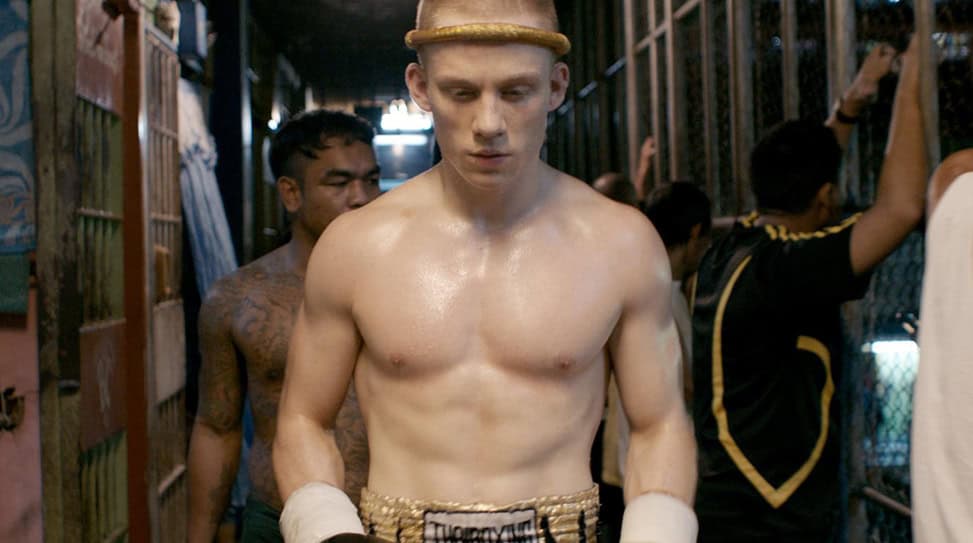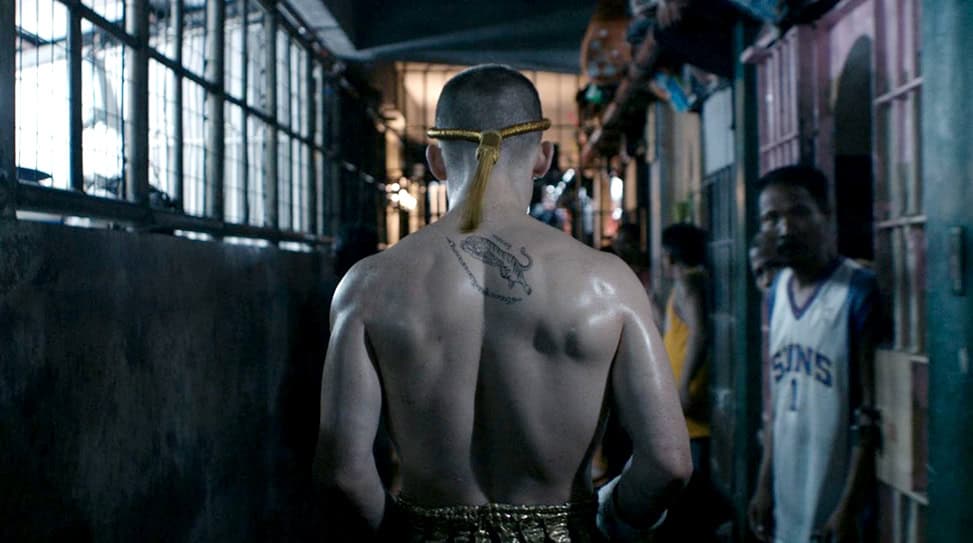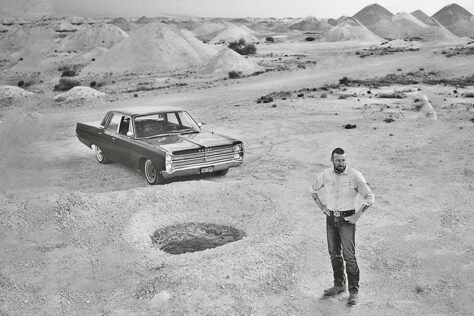You hold yourself in a different way. You walk into a room in a different way. You feel powerful. You feel like an animal.
Jean-Stéphane Sauvaire’s pulpy A Prayer Before Dawn is a no-holds-barred adaptation of junkie-turned-pugilist Billy Moore’s redemptive 2014 memoir A Prayer Before Dawn: A Nightmare in Thailand. It’s an unrelenting symphony of unchecked testosterone, endowed with extra human dimension by Peaky Blinders’ ascending British actor Joe Cole and his ferocious lead performance.
Billy Moore (Cole) is a Liverpudlian who spent three years inside Thailand’s notorious Klong Prem prison, where all order is meted out in brutality. The early reels plunge straight in with Billy bare-knuckling it in seedy Bangkok gyms against local opponents, in order to fund his next round of tin foil smack. When Billy’s arrested and sent to the slammer, the impulsive hothead’s survival strategy is to shout and lash out at every opportunity. Alternately, he takes beatings when he has to, while diving deep into the heroin he buys off a crooked guard. To his benefit, Billy is armed with some decent boxing skills, together with a junkie’s art of wheedling favors out of people who wouldn’t otherwise give him the time of day. A respite for Billy is his sexual encounters with lady-boy inmate Fame (Pornachanok Mabklang), who also provides him with the cigarettes he uses to bribe his way into the Klong Prem boxing collective. The battles take their toll, and with his old bunkmates want paying, Billy is fighting for his life 24 hours a day. With so little dialogue, the wordless series of ordeals told through images of sweating, pummeling, and blood offers little in terms of backstory. It’s only much later that we learn he’s not even the orphan that he claims to be.
Sauvaire’s film world premiered at this year’s Cannes Film Festival as a midnight screening: a graveyard slot the programmers send rough-hewn interlopers deemed unfit for polite company.
The 2nd Annual Macao International Film Festival & Awards ran December 8-14.
Have you been gambling at all, Joe?
No, I haven’t. Have you? [Laughs]
No—thank god. Not my vice. I understand you spent time with Billy Moore in his hometown of Liverpool. From an acting perspective, what did you need from him in your preparation?
I met Billy a year before we shot the film. Jean-Stephane [Sauvaire] wanted us to go spend time in Liverpool with Billy. I was actually filming Peaky Blinders in Liverpool so I got to spend a lot of time going to dinners, meeting his family and the people around him before. When we shot the film, Billy was banned from Thailand so he didn’t come out and we used to speak on Skype. He was a fantastic resource for making this character as three-dimensional and nuanced as possible.
Billy is very complicated, as all addicts are. How did you know how to portray him?
It was just about spending time with him and getting to know him and realizing that, on the surface, you might think he’s this thug who’s a drug dealer from Liverpool, but actually, Billy is a far more complicated and sweet man. He’s almost like a little boy in a man’s body at points. He’s a loving, charismatic person. He just suffered from addiction and insecurity, and these things manifest where he lashes out in violent ways. But actually, he’s a sweet man, really.
I haven’t had a chance to read Billy’s memoir, but it’s really incredible what he went through. How did you wrap your head around what he was doing to get what he wanted in there?
Well, it’s very funny how he writes about this stuff. In his book, he did actually become this nymph to an extent, but he said it was actually to get nice food. [Laughs] So there wasn’t really a fear. He didn’t really subscribe to the guard or anything like that—it was just his way of getting some good food in the cell and sitting down with the Muslims. This is probably more a question for Billy.
How is Billy doing these days?
He’s clean now and doing amazingly well, but it’s an illness. It’s an illness that you have to fight your entire life, like all addicts do. It’s constantly the demon on your shoulder. But he’s doing really well. He’s in Liverpool working with ex-offenders and ex-addicts. But every day is a battle.
With a film like this, there are certain fixations that we have. One of them is how it was shot in Thailand at the Nakhon Pathom prison. That must’ve been invaluable for a performance.
Yeah! The main jail was actually recently closed down. They just cleared all the weeds and basically repopulated it with ex-offenders. And the second jail is actually a real, working prison in the Philippines and there were about 2,700 prisoners. A few people tried to escape there. You couldn’t do this in the U.S. or the UK, you know? It was pretty out there! [Laughs]
I took a hot shower when I got back to my hotel room after watching this movie. This is grimy and raw and brutal. What were the shooting conditions like for you out there?
It wasn’t too dismilar to what you see on the screen. Jean creates a world as true to the real world as possible, so you shoot in a real prison with all real prisoners—guys who spent 5 to 15 years inside—murderers, and ex-prisoner boxer champions who had early release because they won fights. Everybody has got an incredibly interesting life story to tell that they bring to the camera because he wanted them to play versions of themselves. And the boxing is real. It was tough, you know? Jean shoots very long takes. All the fights were long: 10 to 15-minute takes. You become very immersed in that world. I didn’t feel like I was acting a lot of the time. I felt like I was genuinely in the cell with these people trying to bully me, and I’m trying to hold my own to show enough of my skin to survive, but also not too much or else someone will try to stab me. It wasn’t comfortable at all. It was brutal. But that’s kind of what I love. That allowed me to play the part in a better way. It was hard. It was sweaty. All the bruises were real. All the sweat was real.
The punches were connecting?
Every punch connects because Jean shoots in these long takes. You can’t fake a punch. Every punch and every kick connects. So obviously, with that, you’re going to get a few knocks.
Did you ever feel threatened while you were filming? You obviously had the crew there with you, but you’re still put in these very vulnerable situations.
You know what? I didn’t, actually, and the reason I didn’t was because I trained and worked hard in pre-production and then in Thailand. I got to a physical place where I felt strong. I felt like, if it came to it, I could bust a few heads, which is important for the character. I wanted to feel like that. That was important for Billy. I felt like I could really have a fight if I had to. But also, the Thai way is—they’re very respectful. I think all the guys on the film could see that I was trying to show their story. We’re telling Billy’s story, but also telling a version of [these guys’] stories and their lives in prison in Thailand and we wanted to make it as true to real life as possible. Jean’s the same, too—down to every little detail. Then on set, thinking on a lot of movies, this is a lot of bollocks: “Wow, we’re creating a life, we’re recreating a version of our lives.” I think they saw that I was ready to go to lengths with that. They saw that I could really have a fight and they could see that with the punching bags and the sparring and stuff like that. So there was a mutual respect there.
Did you get a sense of what it would actually be like to live in prison?
Yeah—it’s largely meditative. Buddhism is a large part of Thai boxing where it’s sort of a spiritual thing. Buddhism is the main religion out there, I believe. It’s not about being angry and being aggressive. It’s about finding that inner peace. As soon as you find that inner peace, it means you can start winning fights because you have to be of clear mind and all of that stuff. It’s interesting. It was a very therapeutic thing for Billy. With the fighting, he said he was only ever calm and only ever secure when he was fighting. When he wasn’t fighting, he was all over the place.
Did that tame your more brutal instincts?
That was one of the things that Billy always used to say to me on set. I think they said to Billy a lot in prison the Thai phrase: “Jai yen yen,” which means “Keep a cool heart.” It’s like, yeah, you can get so far with just pure brutality and pure aggression, but actually, it’s only when you kind of can relax that you can really start to have success in that sport.
This is a dream role for an actor. How did you convince Jean that you were right for the job?
[Laughs] To be honest, I think there were a couple of other people. I had done a young offenders film called Offender in the UK about the [Her Majesty’s] Young Offender Institution in England a few years ago. I had also done a short film called Slap about a transvestite boxer in the UK. Jean saw those two films and I think he saw the aggression, and also the vulnerability. He said that he thinks he saw I could do both affectively and believably.
When you saw the material, what did you think might be the most challenging thing for you? And looking back, what ended up being most challenging—maybe most surprising to you?
I think the sheer number of fights. The whole script—you don’t get three pages without something kicking off with fighting ensuing, and that’s because Billy was so insecure. I remember him saying to me once: “If someone gave me a compliment, I didn’t know how to take it. ‘You’re a good guy. You’re a cool guy.’ I wouldn’t understand it.” He thought they were taking the piss out of him, you know? He would retaliate with violence. He said, if someone called him “cunt,” he would sort of smile, like, “Yeah, you’re a cunt, too,” you know? [Laughs] He’d quite like it and that’s just an example of the man. He was calm and relaxed when he was fighting. So for me, it was the sheer number of fights—long, hard fights. I’ve done a lot of fight scenes and I know what their like, and I know how Jean wants to shoot them, which is basically as close to being real as possible where all the punches connect and all the sparring are real and long takes. That was the hardest part of it.
You have three brothers. Finn [Cole] we all know is also acting on Peaky Blinders with you. What’s it like to grow up with three brothers? Did you ever have to defend yourself?
It wasn’t too bad, you know? I mean, I was the oldest, so I didn’t have to defend myself too much. I was always the biggest and the strongest. That’s why I poisoned the house with, obviously, a lot of testosterone. I think Billy’s upbringing was a little bit more raucous.
The second fixation people have is your body. Did it make you very self-aware of it?
With the training aspect of it and boxing every day, you naturally become very aware of your body. You become aware of your strength. You become aware of every muscle. You hold yourself in a different way. You walk into a room in a different way. You feel powerful. You feel like an animal. Most of the time, we’re very sedentary in our lives. As soon as you’re training to that sort of level, you feel like you’ve got an instrument that you can use for a damaging effect, I guess. Also, with boxing, I feel like it’s kind of like dancing. You learn moves and you get so used to the same moves, and being able to do the same punching sequences and kicking sequences. Your body becomes second nature. So yeah, I think you do become more aware of your body in that sense.
What kind of diet were you on?
I ate a lot of Pad Thai. [Laughs] I wanted to eat a prison diet, which is eggs and noodles and chicken. I ate a lot of protein. As the shoot went on, I ate less carbs because I sort of wanted to lean out in the final scenes. You can sort of see it in the film: I’m bigger all over and then I lean out towards the end when he becomes a real, proper fighter. I tried to get more of that fighter’s body there. But at the beginning, I was more like a Raging Bull fighter: I ate a lot of Thai food.
Did you continue eating Thai food back in England?
No. [Laughs] That would’ve been too tricky. I was in Thailand for three months. If I stayed with Thai food in England, I would’ve been too sick of it, I think. So no, I didn’t do that.
When a film’s this immersive, is it easy to ease back into your normal life afterwards?
I mean, if it’s after the film. For this one, it was great because I was in Bangkok. I wasn’t around any of my friends or family. I wasn’t drinking. I wasn’t going out. I was fully in this world, speaking in Liverpudlian accent the entire time that I was in Thailand. It would obviously be a bit more tricky to do if I was doing the film in the UK because you have distractions and people will say to you, “Why are you speaking in a Liverpudlian accent? You’re from London.” [Laughs] But out there, nobody knew. Everybody thought I was just speaking in my own voice. Even Jean, who’s French, didn’t know. I mean, he knew, but he really couldn’t feel the difference so it wasn’t weird. But the entire time I was in Thailand, I spoke in Liverpudlian. I actually had to do a softer version of Billy’s accent because, otherwise, nobody would understand it.
You were really living a monk-like life out over there it seems.
When I came back, it was actually very enjoyable because I didn’t abstain. I ate clean, but it wasn’t like I was going crazy doing that. I was like, “I can actually do this.” I always try to get to a level where I can maintain it and it’s not uncomfortable. Yeah—there were points where I just wanted a big bowl of pasta and a nice big cheesecake, but I did it largely on my own. I had a great trainer out there and I worked with him. I know now how to get to that level quite quickly.
What do you do with these learned skills from movies afterwards?
Put them in the bin. I still train. I’m actually a better Thai boxer now than when we did the film. So, who knows? Maybe there’ll be another one. Now I just do it for fun and to keep fit. I think if I do another film, which involves some sort of martial arts or some sort of physical thing, I’ve got a head start over other people because I’ve been fighting in Thai boxing camps and in Thai prisons.
You seem very choosy with your roles. These aren’t easy roles to take on by any means.
It’s true. I suppose, subconsciously, when I got into acting, I wanted to do roles that would put me out of my comfort zone. I looked at films like Bronson with Tom Hardy and Hunger with Michael Fassbender—even though these films are obviously different—and thought, “I want to do my own version of that.” And I did Offender a few years ago, which was kind of in that direction. And then when [A Prayer Before Dawn] came around, it was like, “That’s it! That’s the filmmaker and this is the story.” Then when I met Billy, I thought, “Wow, this guy is such an interesting character and there’s so much to him that’s just underneath the surface you don’t immediately see.”
So what’s next, Joe?
I’ve got Black Mirror coming out early next month. That’s a romcom about dating apps and the future of dating apps and how they might affect our lives in the future. It’s very, very different. I’m looking forward to people seeing it because it’s something that I haven’t done before. Then I have a few bits and pieces in the new year—nothing I can really talk about at the moment.



 Clarion Call: Garrett Hedlund
Clarion Call: Garrett Hedlund A Conversation with Simon Baker
A Conversation with Simon Baker
No Comments